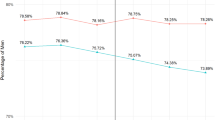Abstract
This review explores the perception of vasectomy on social media to better understand the current online landscape of men’s reproductive health. Evolving sociocultural values and drastic changes in the legal landscape have sparked important conversations about contraception among Americans. Effective contraception options are limited for men. Vasectomy is a safe, reliable, and affordable form of permanent contraception. Men’s reproductive health is often stigmatized, and it is paramount to understand the drivers of this stigmatization, especially as interest in vasectomy appears to be rising. Cultural stigmatization is often reflected online. Social media has become ubiquitous in our culture, with both a broad reach and a strong societal influence. Other domains of reproductive health have seen substantial levels of misinformation online. While it is unclear how the male perception of vasectomy has evolved online over the past few years, the recent growing demand creates a unique avenue for urologists to engage in Men’s Health both in the clinic and online. Urologist-driven efforts online present the opportunity to address misinformation and help ensure prospective patients are better informed regarding their options for contraception.
This is a preview of subscription content, access via your institution
Access options
Subscribe to this journal
Receive 12 print issues and online access
$259.00 per year
only $21.58 per issue
Buy this article
- Purchase on SpringerLink
- Instant access to the full article PDF.
USD 39.95
Prices may be subject to local taxes which are calculated during checkout


Similar content being viewed by others
References
Bole R, Lundy SD, Pei E, Bajic P, Parekh N, Vij SC. Rising vasectomy volume following reversal of federal protections for abortion rights in the United States. Int J Impot Res. 2024;36:265–8.
Ellison JE, Brown-Podgorski BL, Morgan JR. Changes in permanent contraception procedures among young adults following the Dobbs decision. JAMA Health Forum. 2024. https://doi.org/10.1001/jamahealthforum.2024.0424.
Teal S, Edelman A. Contraception selection, effectiveness, and adverse effects: a review. JAMA. 2021;326:2507–18.
Amory JK. Development of novel male contraceptives. Clin Transl Sci. 2020;13:228–37.
Labbok MH, Queenan JT. The use of periodic abstinence for family planning. Clin Obstet Gynecol. 1989;32:387–402.
Hendrix NW, Chauhan SP, Morrison JC. Sterilization and its consequences. Obstet Gynecol Surv. 1999;54:766–77.
Social Media Fact Sheet. Pew Research Center. Available from: https://www.pewresearch.org/internet/fact-sheet/social-media/.
Suarez-Lledo V, Alvarez-Galvez J. Prevalence of health misinformation on social media: systematic review. J Med Internet Res. 2021. https://doi.org/10.2196/17187.
Ostrowski KA, Holt SK, Haynes B, Davies BJ, Fuchs EF, Walsh TJ. Evaluation of vasectomy trends in the United States. Urology. 2018;118:76–9.
Siemons SE, Vleugels MPH, van Balken MR, Braat DDM, Nieboer TE. Male or female sterilization - the decision making process: counselling and regret. Sex Reprod Healthc. 2022. https://doi.org/10.1016/j.srhc.2022.100767.
Ha A, Zhang CA, Li S, Langroudi AP, Basran S, Scott M, et al. A contemporary estimate of vasectomy failure in the United States: analysis of US claims data. J Urol. 2024. https://doi.org/10.1097/JU.0000000000004405.
Trussell J, Lalla AM, Doan QV, Reyes E, Pinto L, Gricar J. Cost effectiveness of contraceptives in the United States. Contraception. 2009;79:5–14.
Monea E, Thomas A. Unintended pregnancy and taxpayer spending. Perspect Sex Reprod Health. 2011;43:88–93.
Handelsman DJ. Male contraception. In: Feingold KR, Ahmed SF, Anawalt B, Blackman MR, Boyce A, Chrousos G, et al. editors. Endotext. Available from: https://www.ncbi.nlm.nih.gov/books/NBK279094/.
Fu H, Darroch JE, Haas T, Ranjit N. Contraceptive failure rates: new estimates from the 1995 National Survey of Family Growth. Fam Plann Perspect. 1999;31:56–63.
Bradley SEK, Polis CB, Bankole A, Croft T. Global contraceptive failure rates: who is most at risk? Stud Fam Plann. 2019;50:3–24.
Liddon N, O’Malley Olsen E, Carter M, Hatfield-Timajchy K. Withdrawal as pregnancy prevention and associated risk factors among US high school students: findings from the 2011 National Youth Risk Behavior Survey. Contraception. 2016;93:126–32.
Ranjit N, Bankole A, Darroch JE, Singh S. Contraceptive failure in the first two years of use: differences across socioeconomic subgroups. Fam Plann Perspect. 2001;33:19–27.
Shih SL, Kebodeaux CA, Secura GM, Allsworth JE, Madden T, Peipert JF. Baseline correlates of inconsistent and incorrect condom use among sexually active women in the contraceptive CHOICE Project. Sex Transm Dis. 2011;38:1012–9.
Randolph ME, Pinkerton SD, Bogart LM, Cecil H, Abramson PR. Sexual pleasure and condom use. Arch Sex Behav. 2007;36:844–8.
Marfatia YS, Pandya I, Mehta K. Condoms: Past, present, and future. Indian J Sex Transm Dis AIDS. 2015;36:133–9.
Kost K, Singh S, Vaughan B, Trussell J, Bankole A. Estimates of contraceptive failure from the 2002 National Survey of Family Growth. Contraception. 2008;77:10–21.
Sundaram A, Vaughan B, Kost K, Bankole A, Finer L, Singh S, et al. Contraceptive failure in the united states: estimates from the 2006-2010 national survey of family growth. Perspect Sex Reprod Health. 2017;49:7–16.
Gallo MF, Grimes DA, Schulz KF. Nonlatex vs. latex male condoms for contraception: a systematic review of randomized controlled trials. Contraception. 2003;68:319–26.
Deneux-Tharaux C, Kahn E, Nazerali H, Sokal DC. Pregnancy rates after vasectomy: a survey of US urologists. Contraception. 2004;69:401–6.
Schwingl PJ, Guess HA. Safety and effectiveness of vasectomy. Fertil Steril. 2000;73:923–36.
Jacobstein R, Radloff S, Khan F, Mimno K, Pal M, Snell J, et al. Down but not out: vasectomy is faring poorly almost everywhere-we can do better to make it a true method option. Glob Health Sci Pract. 2023. https://doi.org/10.9745/GHSP-D-22-00369.
Eeckhaut MCW, Rendall MS, Zvavitch P. Women’s use of long-acting reversible contraception for birth timing and birth stopping. Demography. 2021;58:1327–46.
Zhang X, Eisenberg ML. Vasectomy utilization in men aged 18-45 declined between 2002 and 2017: Results from the United States National Survey for Family Growth data. Andrology. 2022;10:137–42.
White K, Martínez Órdenes M, Turok DK, Gipson JD, Borrero S. Vasectomy knowledge and interest among U.S. men who do not intend to have more children. Am J Mens Health. 2022. https://doi.org/10.1177/15579883221098574.
Campbell AD, Turok DK, White K. Fertility intentions and perspectives on contraceptive involvement among low-income men aged 25 to 55. Perspect Sex Reprod Health. 2019;51:125–33.
Agarwal A, Mulgund A, Hamada A, Chyatte MR. A unique view on male infertility around the globe. Reprod Biol Endocrinol. 2015;13:37.
Zaila KE, Osadchiy V, Shahinyan RH, Mills JN, Eleswarapu SV. Social media sensationalism in the male infertility space: a mixed methodology analysis. World J Mens Health. 2020;38:591–8.
Yang F, Li J, Dong L, Tan K, Huang X, Zhang P, et al. Review of vasectomy complications and safety concerns. World J Mens Health. 2021;39:406–18.
White K, Potter JE. Reconsidering racial/ethnic differences in sterilization in the United States. Contraception. 2014;89:550–6.
Borrero S, Schwarz EB, Reeves MF, Bost JE, Creinin MD, Ibrahim SA. Does vasectomy explain the difference in tubal sterilization rates between black and white women? Fertil Steril. 2009;91:1642–5.
Averbach S, Ha D, Meadows A, Brubaker L, Gyamfi-Bannerman C. Failure to progress: structural racism in women’s healthcare. EClinicalMedicine. 2023. https://doi.org/10.1016/j.eclinm.2023.101861.
Eisenberg ML, Henderson JT, Amory JK, Smith JF, Walsh TJ. Racial differences in vasectomy utilization in the United States: data from the national survey of family growth. Urology. 2009;74:1020–4.
McCray N, Thompson L, Branch F, Porter N, Peterson J, Perry MJ. Talking about public health with african american men: perceptions of environmental health and infertility. Am J Mens Health. 2020. https://doi.org/10.1177/1557988320901375.
Mock KO, Moyer A, Lobel M. Explaining sex discrepancies in sterilization rates in the United States: An evidence-informed commentary. Perspect Sex Reprod Health. 2023;55:116–21.
Breland JY, Quintiliani LM, Schneider KL, May CN, Pagoto S. Social media as a tool to increase the impact of public health research. Am J Public Health. 2017;107:1890–1.
Chen J, Wang Y. Social media use for health purposes: systematic review. J Med Internet Res. 2021. https://doi.org/10.2196/17917.
Braun LA, Zomorodbakhsch B, Keinki C, Huebner J. Information needs, communication and usage of social media by cancer patients and their relatives. J Cancer Res Clin Oncol. 2019;145:1865–75.
Foster P, Luebke M, Razzak AN, Anderson DJ, Hasoon J, Viswanath O, et al. Stigmatization as a Barrier to Urologic Care: A Review. Health Psychol Res. 2023. https://doi.org/10.52965/001c.84273.
Merz AA, Gutiérrez-Sacristán A, Bartz D, Williams NE, Ojo A, Schaefer KM, et al. Population attitudes toward contraceptive methods over time on a social media platform. Am J Obstet Gynecol. 2021. https://doi.org/10.1016/j.ajog.2020.11.042.
Huang M, Gutiérrez-Sacristán A, Janiak E, Young K, Starosta A, Blanton K, et al. Contraceptive content shared on social media: an analysis of Twitter. Contracept Reprod Med. 2024. https://doi.org/10.1186/s40834-024-00262-2.
Stevens R, Gilliard-Matthews S, Dunaev J, Todhunter-Reid A, Brawner B, Stewart J. Social media use and sexual risk reduction behavior among minority youth: seeking safe sex information. Nurs Res. 2017;66:368–77.
Ferreira Caceres MM, Sosa JP, Lawrence JA, Sestacovschi C, Tidd-Johnson A, Rasool MHU, et al. The impact of misinformation on the COVID-19 pandemic. AIMS Public Health. 2022;9:262–77.
Pagoto SL, Palmer L, Horwitz-Willis N. The next infodemic: abortion misinformation. J Med Internet Res. 2023. https://doi.org/10.2196/42582.
Foran T. Contraception and the media: lessons past, present and future. Eur J Contracept Reprod Health Care. 2019;24:80–2.
Conti JA, Cahill E. Abortion in the media. Curr Opin Obstet Gynecol. 2017;29:427–30.
Pfender EJ, Tsiandoulas K, Morain SR, Fowler LR. Hormonal contraceptive side effects and nonhormonal alternatives on TikTok: a content analysis. Health Promot Pract. 2024. https://doi.org/10.1177/15248399231221163.
Nguyen V, Li MK, Leach MC, Patel DP, Hsieh TC. Comparison of childless and partnerless vasectomy rates before and after Dobbs v. Jackson Women’s Health Organization. Am J Mens Health. 2024. https://doi.org/10.1177/15579883241260511.
United States Reports. Dobbs, State Health Officer of the Mississippi Department of Health et al. v. Jackson Women’s Health Organization et al. Vol. 597, 2022.
Brindis CD, Laitner MH, Clayton EW, Scrimshaw SC, Grosz BJ, Simpson LA, et al. Societal implications of the Dobbs v Jackson Women’s Health Organization decision. Lancet. 2024;403:2751–4.
Sellke N, Tay K, Sun HH, Tatem A, Loeb A, Thirumavalavan N. The unprecedented increase in Google searches for “vasectomy” after the reversal of Roe vs. Wade. Fertil Steril. 2022;118:1186–8.
Pierson BC, Banaag A, Janvrin ML, Koehlmoos TP. Vasectomy incidence in the military health system after the reversal of Roe v. Wade. Int J Impot Res. 2024. https://doi.org/10.1038/s41443-024-00905-7.
Hanna E, Gough B. Searching for help online: an analysis of peer-to-peer posts on a male-only infertility forum. J Health Psychol. 2018;23:917–28.
Loeb S, Carrick T, Frey C, Titus T. Increasing Social Media Use in Urology: 2017 American Urological Association Survey. Eur Urol Focus. 2020;6:605–8.
Dubin JM, Aguiar JA, Lin JS, Greenberg DR, Keeter MK, Fantus RJ, et al. The broad reach and inaccuracy of men’s health information on social media: analysis of TikTok and Instagram. Int J Impot Res. 2024;36:256–60.
Tzelves L, Talyshinskii A, Nedbal C, Mykoniatis I, Beisland C, Roth I, et al. Patient perspectives on vasectomy: findings from a TikTok® content analysis. Int J Impot Res. 2024. https://doi.org/10.1038/s41443-024-00931-5.
Aguiar JA, Greenberg DR, Brannigan RE, Halpern JA, Dubin JM. Beyond the prescription: trends and challenges in erectile dysfunction medications among young adult men. Int J Impot Res. 2024. https://doi.org/10.1038/s41443-024-00902-w.
Author information
Authors and Affiliations
Contributions
All authors have made significant contributions to the writing of the manuscript, reporting of our findings, and have approved the manuscript for submission. AP contributed to conception and design, data analysis and interpretation, and drafting the manuscript. JS contributed to conception and design, data analysis and interpretation, and critical revision of the manuscript for scientific and factual content. EP contributed to conception and design, data analysis and interpretation, and critical revision of the manuscript for scientific and factual content. JD is the senior author and contributed to conception, design, and critical revision of the manuscript for scientific and factual content.
Corresponding author
Ethics declarations
Competing interests
The authors declare no competing interests.
Additional information
Publisher’s note Springer Nature remains neutral with regard to jurisdictional claims in published maps and institutional affiliations.
Supplementary information
Rights and permissions
Springer Nature or its licensor (e.g. a society or other partner) holds exclusive rights to this article under a publishing agreement with the author(s) or other rightsholder(s); author self-archiving of the accepted manuscript version of this article is solely governed by the terms of such publishing agreement and applicable law.
About this article
Cite this article
Patel, A.U., Schammel, J., Panken, E.J. et al. The influence of social media on patient and public perception of vasectomy: a narrative review. Int J Impot Res (2025). https://doi.org/10.1038/s41443-025-01114-6
Received:
Revised:
Accepted:
Published:
Version of record:
DOI: https://doi.org/10.1038/s41443-025-01114-6



